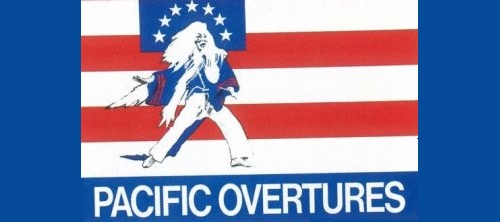
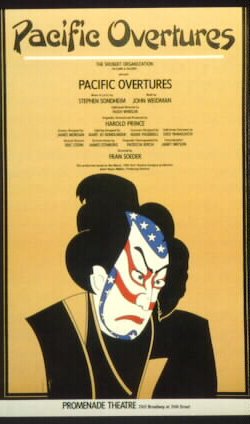
Version 4
Pacific Overtures (1984-10-Promenade Theatre-Off Broadway)
Type de série: RevivalThéâtre: Promenade Theatre (Broadway (Off) - Etats-Unis) Durée : 3 mois Nombre : 109 représentationsPremière Preview : jeudi 25 octobre 1984Première : jeudi 25 octobre 1984Dernière : vendredi 27 janvier 1984Mise en scène : Fran Soeder • Chorégraphie : Janet Watson • Producteur : Avec : Ernest Abuba (Reciter), John Bantay (Commodore Perry), John Baray (Old Man / American Admiral), Chuck Brown (Shogun's Mother / British Admiral), John Caleb (John / Manjiro / Fisherman / French Admiral), Ray Contreras (Warrior / British Sailor), Tim Ewing (Thief), Timm Fujii (Tamate / British Sailor), Kevin Gray (Kayama Yesaemon), Gerri Igarashi (Proscenium Servant), Thomas Ikeda (Madam / Russian Admiral), Francis Jue (Boy / Dutch Admiral / British Sailor), Gayln Kong (Proscenium Servant), Diane Lam (Proscenium Servant), Tony Marino (Lord Abe), Tom Matsusaka (Imperial Priest), Christine Toy (Proscenium Servant), Allan Tung (Fencing Master's Daughter), Ronald Yamamoto (Merchant)
A musical with book by John Weidman, Pacific Overtures traces the history of Japan from the first contact with America (via Commodore Matthew Perry) through the modern age. The "development" of the country is represented by two characters, Kayama Yasaemon, a traditional samurai, and his friend Manjiro, a fisherman who had been shipwrecked in Boston, where he embraced Western ways. As Japan becomes more Westernized, Kayama embraces the new culture while Manjiro rejects it, rediscovering his roots. All this is acted out against a backdrop of the greater changes in Japan, as the Japanese and the world powers all try to capitalize on the opening up of Japan.
The title of the work is drawn directly from text in a letter from Admiral Perry addressed to the Emperor dated July 7, 1853: "Many of the large ships-of-war destined to visit Japan have not yet arrived in these seas, though they are hourly expected; and the undersigned, as an evidence of his friendly intentions, has brought but four of the smaller ones, designing, should it become necessary, to return to Edo in the ensuing spring with a much larger force. But it is expected that the government of your imperial majesty will render such return unnecessary, by acceding at once to the very reasonable and pacific overtures contained in the President's letter, and which will be further explained by the undersigned on the first fitting occasion."
Pacific Overtures opened on Broadway at the Winter Garden Theatre on January 11, 1976, and closed after 193 performances on June 27, 1976. Directed by Harold Prince, the choreography was by Patricia Birch, scenic design by Boris Aronson, costume design by Florence Klotz, and lighting design by Tharon Musser. The original cast recording was released originally by RCA Records and later on CD. This production was nominated for 10 Tony Awards, and won Best Scenic Design (Boris Aronson) and Best Costume Design (Florence Klotz).
An off-Broadway production ran at the Promenade Theatre from October 25, 1984 for 109 performances, transferring from an earlier production at the York Theatre Company. Directed by Fran Soeder with choreography by Janet Watson, the cast featured Ernest Abuba and Kevin Gray.
The European premiere was directed by Howard Lloyd-Lewis (Library Theatre, Manchester) at Wythenshawe Forum in 1986 with choreography by Paul Kerryson who subsequently directed productions in 1993 and 2006 at Leicester Haymarket Theatre.
A major production of the show was mounted in London by the English National Opera in 1987. The production was recorded in its entirety, preserving nearly the entire libretto as well as the score.
A critically acclaimed 2001 Chicago Shakespeare Theater production, directed by Gary Griffin,[5] transferred to the West End Donmar Warehouse, where it ran from June 30, 2003 until September 6, 2003 and received the 2003 Olivier Award for Best Musical Production.
In 2002 the New National Theatre of Tokyo presented two limited engagements of their production, which was performed in Japanese with English supertitles. The production ran at Avery Fisher Hall, Lincoln Center from July 9, 2002 through July 13, and then at the Eisenhower Theater, Kennedy Center, from September 3, 2002 through September 8.
A Broadway revival ran at Studio 54 from December 2, 2004 to January 30, 2005, directed by Amon Miyamoto and starring B.D. Wong as the Narrator and several members of the original cast. A new Broadway recording, with new (reduced) orchestrations by orchestrator Jonathan Tunick was released by PS Classics, with additional material not included on the original cast album.[4] The production was nominated for four Tony Awards, including Best Revival of a Musical.
The Original broadway production was filmed and broadcast on Japanese television in 1976.
Act One
Prologue — Orchestra
The Advantages of Floating in the Middle of the Sea — Reciter and Company
There Is No Other Way — Tamate, Observers
Four Black Dragons — Fisherman, Thief, Reciter, Townspeople
Chrysanthemum Tea — Shogun, Shogun's Mother, Shogun's Wife, Soothsayer, Priests, Shogun's Companion, Physician, Sumo Wrestlers
Poems — Kayama, Manjiro
Welcome to Kanagawa — Madam and Girls
March to the Treaty House — Orchestra
Someone in a Tree — Old Man, Reciter, Boy, Warrior
Lion Dance — Commodore Perry
Act Two
Please Hello — Abe, Reciter, American, British, Dutch, Russian and French Admirals)
A Bowler Hat — Kayama
Pretty Lady — Three British Sailors
Next — Reciter and Company
Mako — Reciter, Shogun, Jonathan Goble
Soon-Teck Oh — Tamate, Kayama's Wife, Samurai, Storyteller, Swordsman
Isao Sato — Kayama
Yuki Shimoda — Abe, First Councillor
Sab Shimono — Manjiro
Ernest Abuba — Samurai, Adams, Noble
James Dybas — Second Councillor, Old Man, French Admiral
Timm Fujii — Son, Priest, Girl, Noble, British Sailor
Haruki Fujimoto — Servant, Commodore Matthew Calbraith Perry
Larry Hama — Williams, Lord of the South
Ernest Harada — Physician, Madam, British Admiral
Alvin Ing — Shogun's Mother, Observer, Merchant, American Admiral,
Patrick Kinser-Lau — Shogun's Companion, Girl, Dutch Admiral, British Sailor
Jae Woo Lee — Fisherman, Sumo Wrestler, Lord of the South
Freddy Mao — Third Councillor, Samurai's Daughter
Tom Matsusaka — Imperial Priest
Freda Foh Shen — Shogun's Wife
Mark Hsu Syers — Samurai, Thief, Soothsayer, Warrior, Russian Admiral, British Sailor
Ricardo Tobia — Observer
Gedde Watanabe — Priest, Girl, The Boy
Conrad Yama — Grandmother, Sumo Wrestler, Japanese Merchant
Fusako Yoshida — Musician, Shamisen
Proscenium Servants, Sailors and Townspeople: Kenneth S. Eiland, Timm Fujili, Joey Ginza, Patrick Kinser-Lau, Diane Lam, Tony Marinyo, Kevin Maung, Kim Miyori, Dingo Secretario, Freda Foh Shen, Mark Hsu Seyers, Gedde Watanabe, Leslie Watanabe, Ricardo Tobia
Aucun dossier informatif complémentaire concernant Pacific Overtures

Version 1
Pacific Overtures (1975-11-Shubert Theatre-Boston)
Type de série: Pre-Broadway Try OutThéâtre: Shubert Theatre (Boston - Etats-Unis) Durée : 3 semaines Nombre : Première Preview : samedi 08 novembre 1975Première : samedi 08 novembre 1975Dernière : samedi 29 novembre 1975Mise en scène : Harold Prince • Chorégraphie : Patricia Birch • Producteur :

Version 2
Pacific Overtures (1975-12-Kennedy Center for the Performing Arts-Washington)
Type de série: Pre-Broadway Try OutThéâtre: Kennedy Center for the Performing Arts (Washington - Etats-Unis) Durée : 3 semaines Nombre : Première Preview : jeudi 04 décembre 1975Première : jeudi 04 décembre 1975Dernière : samedi 27 décembre 1975Mise en scène : Harold Prince • Chorégraphie : Patricia Birch • Producteur :
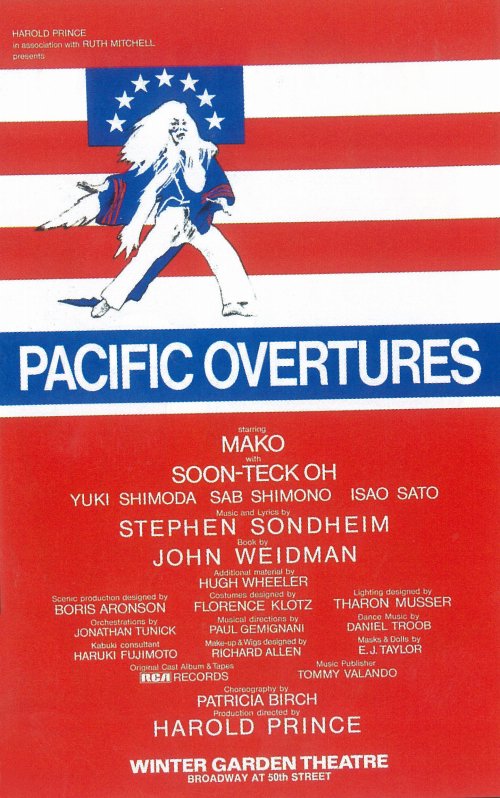
Version 3
Pacific Overtures (1976-01-Winter Garden Theatre-Broadway)
Type de série: OriginalThéâtre: Winter Garden Theatre (Londres - Angleterre) Durée : 5 mois 2 semaines Nombre : 13 previews - 193 représentationsPremière Preview : mercredi 31 décembre 1975Première : dimanche 11 janvier 1976Dernière : dimanche 27 juin 1976Mise en scène : Harold Prince • Chorégraphie : Patricia Birch • Producteur : Avec : Reciter - Mako / Abe, First Councillor - Yuki Shimoda / Manjiro - Sab Shimono / Second Councillor - James Dybas / Shogun's Mother - Alvin Ing / Third Councillor - Freddy Mao / Kayama - Isao Sato / Tamate, Samurai, Storyteller, Swordsman - Soon-Teck Oh / Samurai - Ernest Abuba, Mark Hsu Syers / Servant - Haruki Fujimoto / Observers - Alvin Ing, Ricardo Tobia / Fisherman - Jae Woo Lee / Merchant - Alvin Ing / Son - Timm Fujii / Grandmother - Conrad Yama / Thief - Mark Hsu Syers / Adams - Ernest Abuba / Williams - Larry Hama / Commodore Perry - Haruki Fujimoto / Shogun's Wife - Freda Foh Shen / Physician - Ernest Harada / Priests - Timm Fujii, Gedde Watanabe / Soothsayer - Mark Hsu Syers / Sumo Wrestlers - Conrad Yama, Jae Woo Lee / Shogun's Companion - Patrick Kinser-Lau / Shogun - Mako / Madam - Ernest Harada / Girls - Timm Fujii, Patrick Kinser-Lau, Gedde Watanabe, Leslie Watanabe / Old Man - James Dybas / Boy - Gedde Watanabe / Warrior - Mark Hsu Syers / Imperial Priest - Tom Matsusaka / Nobles - Ernest Abuba, Timm Fujii / American Admiral - Alvin Ing / British Admiral - Ernest Harada/ Dutch Admiral - Patrick Kinser-Lau / Russian Admiral - Mark Hsu Syers / French Admiral - James Dybas / Lords of the South - Larry Hama, Jae Woo Lee / Jonathan Goble - Mako / Japanese Merchant - Conrad Yama / Samurai's Daughter - Freddy Mao / British Sailors - Timm Fujii, Patrick Kinser-Lau, Mark Hsu Syers / Proscenium Servants, Sailors, and Townspeople - Susan Kikuchi, Diane Lam, Kim Miyori, Freda Foh Shen, Kenneth S. Eiland, Timm Fujii, Joey Ginza, Patrick Kinser-Lau, Tony Marinyo, Kevin Maung, Dingo Secretario, Mark Hsu Syers, Ricardo Tobia, Gedde Watanabe, and Leslie Watanabe

Version 4
Pacific Overtures (1984-10-Promenade Theatre-Off Broadway)
Type de série: RevivalThéâtre: Promenade Theatre (Broadway (Off) - Etats-Unis) Durée : 3 mois Nombre : 109 représentationsPremière Preview : jeudi 25 octobre 1984Première : jeudi 25 octobre 1984Dernière : vendredi 27 janvier 1984Mise en scène : Fran Soeder • Chorégraphie : Janet Watson • Producteur : Avec : Ernest Abuba (Reciter), John Bantay (Commodore Perry), John Baray (Old Man / American Admiral), Chuck Brown (Shogun's Mother / British Admiral), John Caleb (John / Manjiro / Fisherman / French Admiral), Ray Contreras (Warrior / British Sailor), Tim Ewing (Thief), Timm Fujii (Tamate / British Sailor), Kevin Gray (Kayama Yesaemon), Gerri Igarashi (Proscenium Servant), Thomas Ikeda (Madam / Russian Admiral), Francis Jue (Boy / Dutch Admiral / British Sailor), Gayln Kong (Proscenium Servant), Diane Lam (Proscenium Servant), Tony Marino (Lord Abe), Tom Matsusaka (Imperial Priest), Christine Toy (Proscenium Servant), Allan Tung (Fencing Master's Daughter), Ronald Yamamoto (Merchant)
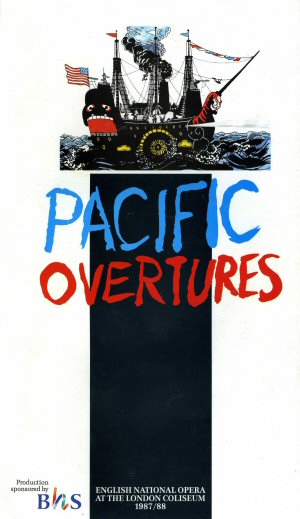
Version 5
Pacific Overtures (1987-09-Coliseum Theatre-London)
Type de série: Original LondonThéâtre: Coliseum Theatre (Londres - Angleterre) Durée : 2 mois 2 semaines Nombre : 27 représentationsPremière Preview : jeudi 10 septembre 1987Première : jeudi 10 septembre 1987Dernière : jeudi 26 novembre 1987Mise en scène : Keith Warner • Chorégraphie : David Toguri • Producteur : Avec : Richard Angas (Reciter), Malcolm Rivers (Kayama), Christopher Booth-Jones (Manjiro), John Kitchiner (Lord Abe), Graham Fletcher (Commodore Perry), Michael Sadler (Tamate), Simon Masterton-Smith (The Shogun’s Mother), Terry Jenkins (Madam)Commentaires : This revolutionary work had a musical score which started with the haunting and mournful sounds of shamisen, shakuhachi and Japanese tonal ranges and gradually, as the country became more Westernised, so did the music - until the final scene is one of frantic heavy rock. It was a history of Japan written from the viewpoint of the Japanese and performed in the style of Kabuki Theatre, with “invisible” stage hands, all the women’s roles played by men, and a “reciter” who comments on the action, reciting the occasional haiku. The critics split exactly in half: it was the most astonishing, original, exciting, profound and brilliant musical; it was a pretty but incomprehensible bore.
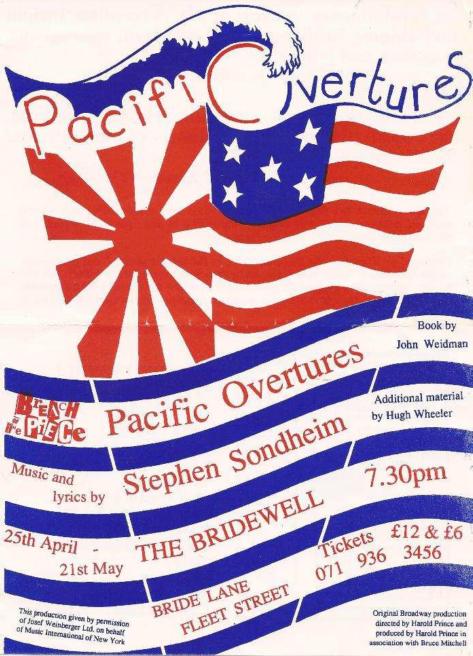
Version 6
Pacific Overtures (1994-04-Bridewell Theatre-London)
Type de série: RevivalThéâtre: Bridewell Theatre (Londres - Angleterre) Durée : 3 semaines Nombre : Première Preview : lundi 25 avril 1994Première : lundi 25 avril 1994Dernière : samedi 21 mai 1994Mise en scène : Carol Metcalfe • Chorégraphie : Producteur : Avec : Roland Beame, Francis Crampsie, Lyanna Iveson, Thomas Monk, Rosalind Moore, Clive Paget, Tim Sawers, Victoria Simmonds, Marton York.Commentaires : This was the second production by the resident company at the newly opened Bridewell Theatre—a converted Victoria swimming bath and laundry, just off Fleet Street. There were acoustic and spatial problems with the new venue, and the peculiar effect of the orchestra being hidden in what used to be the swimming pool and the conductor occasionally popping his head above stage for the benefit of the singers. The production chose to use a mixed cast (the original had used an all-male cast in the Japanese Kabuki traditions). It was felt
that what had been big and unwieldy on the Coliseum stage at its premiere now gained a great deal from its more intimate setting and performance space, but generally the performance and production was felt to be a bit lacklustre and unexciting.
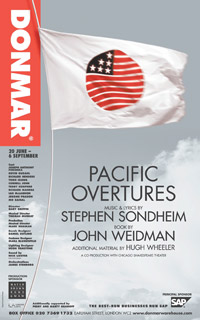
Version 7
Pacific Overtures (2003-06Donmar Warehouse-London)
Type de série: RevivalThéâtre: Donmar Warehouse (Londres - Angleterre) Durée : 2 mois 1 semaine Nombre : Première Preview : vendredi 20 juin 2003Première : lundi 30 juin 2003Dernière : samedi 06 septembre 2003Mise en scène : Gary Griffin • Chorégraphie : Producteur : Avec : Joseph Anthony Foronda (Reciter / Shogun / Emperor), Kevin Gudhal (Kcryama), Togo Igawa, Teddy Kempner, Ian McLarnon, Jerome Pradon, Richard Henders, Mo Zainal, Rocjard Manera, Cornell JohnCommentaires : With a cast of just ten performers and four musicians in a mixed American and English company, this show had originated at the Chicago Shakespeare Theater. Once again it split the critics (and the audiences) into two opposing camps:
(1) This sparse, cut-down production gave the work a clarity, strength and intellectual brilliance that had been missing from the “overblown” English National Opera premiere in 1987, and marked it as one of Sondheim’s most fascinating and rewarding works of art.
(2) This production clearly reveals the show to be culturally awkward, with condescending Western attitudes offering half-baked imitations of Kabuki which come over as pier-end panto. By a slight majority, the critics hailed this as a major triumph, but there was still a significant number strongly against the show.Presse : CHARLES SPENCER for THE DAILY TELEGRAPH says, "..facetious bore....lacks pace and pep."
PAUL TAYLOR for THE INDEPENDENT says, "It's a musical of ideas more than of character and, at times, the proceedings can feel a little desiccated."
BENEDICT NIGHTINGALE for THE TIMES says, "It still left me unmoved and exasperated."
MICHAEL BILLINGTON for THE GUARDIAN says, "this is still a great musical that satirises America's historical determination to impose its values on other civilisations." He goes on to say, "This musical ripples with felt emotion."
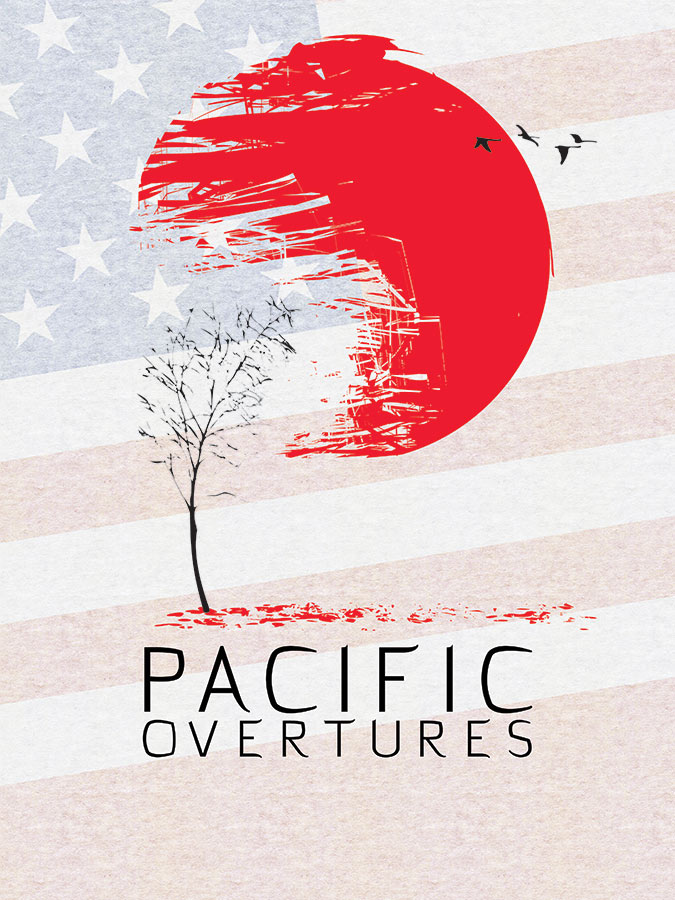
Version 8
Pacific Overtures (2014-07-Union Theatre-London)
Type de série: RevivalThéâtre: Union Theatre (Londres - Angleterre) Durée : 4 semaines Nombre : Première Preview : mercredi 02 juillet 2014Première : vendredi 04 juillet 2014Dernière : samedi 02 août 2014Mise en scène : Michael Strassen • Chorégraphie : Producteur : Avec : Ken Christiansen (Reciter), Oli Reynolds (Kayama), Emanuel Alba (Manjiro/Dutch Admiral), Alex Mcmorran (Lord Abe), Marc Lee Joseph (Shogun's Mother/French Admiral), Ian Mowat (Madam/Old Man/British Admiral), Joel Harper-Jackson (Geisha/American Admiral/Sailor), Lee Van-Geleen (Thief/Russian Admiral/Sailor), Matt Jolly (Fisherman/Geisha/Young Boy), Anthony Selywn (Tamate), Marios Nicolaides (Commodore Perry), Joel Baylis (Priest/Geisha/Sailor), and Josh Andrews (Priest/Geisha).Commentaires : Additional material by Hugh Wheeler and Original Orchestrations by Jonathan Tunick
Musical Direction by Richard Bates.
Pas encore de video disponible pour ce spectacle

.png)
.png)




